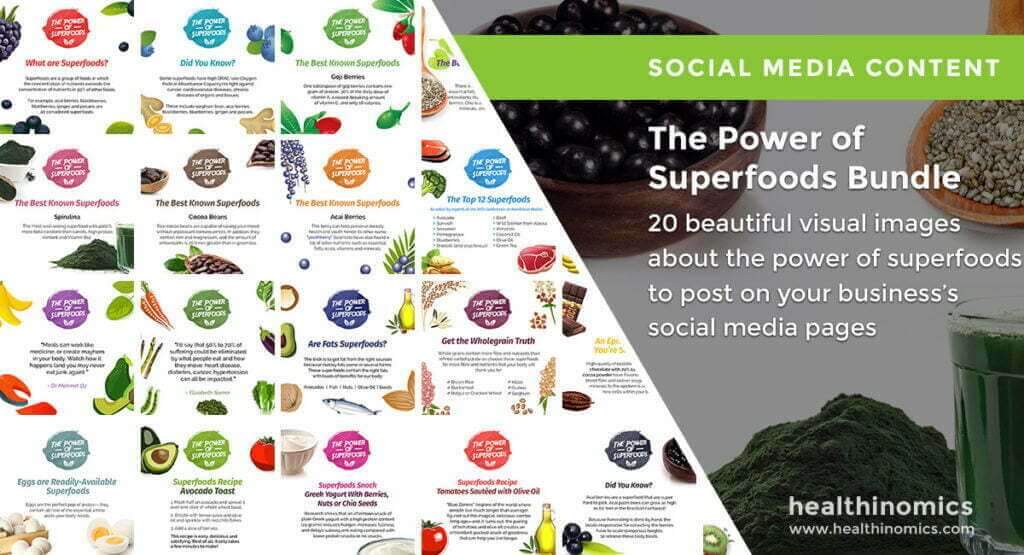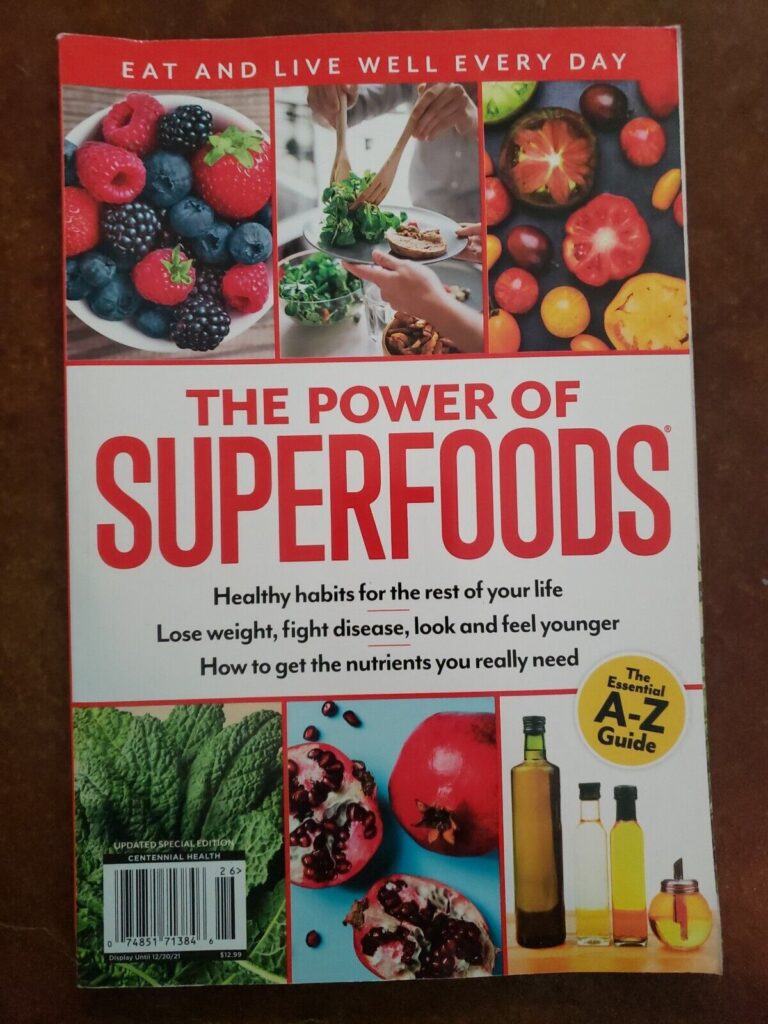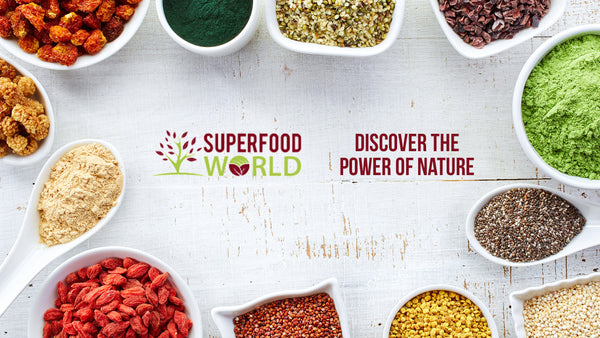I’ve always been amazed at the incredible impact that certain foods can have on our health and well-being. That’s why I couldn’t wait to share with you the power of superfoods. These highly nutritious and delicious foods not only provide essential vitamins and minerals, but they also offer numerous health benefits. From boosting immunity to improving brain function, superfoods are the ultimate secret to achieving a healthy and vibrant lifestyle. So, join me on this journey as we uncover the incredible power of superfoods for a healthier you.
What are Superfoods?

Definition of Superfoods
Superfoods are a group of nutrient-dense foods that are packed with various vitamins, minerals, antioxidants, and other beneficial compounds. These foods are considered “super” due to their exceptional nutritional profiles and numerous health benefits. They are natural powerhouses that can provide our bodies with the essential nutrients they need to thrive.
Characteristics of Superfoods
Superfoods possess several key characteristics that set them apart from other foods. Firstly, they are typically high in essential nutrients such as vitamins, minerals, and antioxidants. These nutrients play a vital role in supporting overall health and wellness. Secondly, superfoods are often rich in fiber, which aids in digestion, promotes satiety, and helps regulate blood sugar levels. Lastly, superfoods are known for their low caloric content, making them a suitable addition to a balanced diet for weight management.
Different Types of Superfoods
Superfoods come in various forms and are derived from different food groups. Some examples of common superfoods include berries, leafy greens, nuts and seeds, fish and seafood, whole grains, legumes, turmeric, garlic, ginger, and green tea. Each type of superfood offers unique health benefits and can be enjoyed in a variety of delicious ways.
Benefits of Superfoods
Nutrient Density
One of the primary benefits of consuming superfoods is their exceptional nutrient density. Superfoods are jam-packed with vitamins, minerals, and antioxidants, which are essential for proper bodily functions. By incorporating these nutrient-rich foods into our diet, we can ensure that our bodies receive the necessary building blocks for optimal health and vitality.
Antioxidant Properties
Many superfoods are rich in antioxidants, which help protect our cells from damage caused by harmful molecules called free radicals. Antioxidants neutralize these free radicals, reducing the risk of chronic diseases such as heart disease, cancer, and neurodegenerative disorders. Superfoods like berries, green tea, and turmeric are particularly notable for their potent antioxidant properties.
Boosting Immune System
Superfoods are excellent for boosting and supporting the immune system. The vitamins, minerals, and antioxidants found in these foods help strengthen our body’s natural defense mechanisms, making us more resistant to infections and illnesses. Leafy greens, citrus fruits, and garlic are among the superfoods known for their immune-boosting properties.
Weight Management
For those striving to achieve or maintain a healthy weight, superfoods are a valuable ally. These nutrient-dense foods are low in calories but high in fiber, protein, and other satiating nutrients. As a result, they can help control appetite, promote feelings of fullness, and provide sustained energy throughout the day. Incorporating superfoods like lean proteins, leafy greens, and whole grains into meals can support weight management goals.
Heart Health
Several superfoods have been associated with cardiovascular health benefits. They help reduce inflammation, improve cholesterol levels, regulate blood pressure, and enhance overall heart function. Superfoods such as fatty fish, nuts and seeds, berries, and whole grains are known for their positive impact on heart health. By including these foods in our diet, we can take proactive steps towards maintaining a healthy heart.
Improved Digestion
Proper digestion is essential for overall well-being, and superfoods can contribute to better digestive health. Many superfoods are rich in fiber, which aids in digestion, promotes regular bowel movements, and prevents constipation. Additionally, superfoods like ginger and turmeric possess anti-inflammatory properties that soothe the digestive system and alleviate symptoms such as bloating or indigestion.

Cancer Prevention
Certain superfoods have been associated with a reduced risk of developing various types of cancer. The antioxidants and phytochemicals present in these foods help protect cells from DNA damage, inhibit the growth of cancer cells, and reduce inflammation in the body. Cruciferous vegetables like broccoli and kale, as well as berries and green tea, are examples of superfoods with cancer-fighting properties.
Brain Function
The brain requires proper nutrition to function optimally, and superfoods can provide the necessary nutrients for brain health. Omega-3 fatty acids found in fatty fish, antioxidants in berries, and turmeric’s anti-inflammatory properties have all been linked to improved cognitive function, memory, and focus. Including these superfoods in our diet may support a healthy brain and potentially reduce the risk of age-related cognitive decline.
Healthy Skin and Hair
Superfoods can contribute to radiant, healthy skin and luscious hair. The vitamins, minerals, and antioxidants found in these foods help protect the skin from damage caused by free radicals, promote collagen production, and maintain overall skin health. Superfoods like berries, green tea, nuts, and seeds are known for their beneficial effects on skin and hair.
Common Superfoods
Berries
Berries such as blueberries, strawberries, raspberries, and blackberries are rich in antioxidants, fiber, and vitamins. They offer numerous health benefits, including improved heart health, cognitive function, and reduced risk of chronic diseases.
Leafy Greens
Leafy greens like spinach, kale, and Swiss chard are packed with vitamins A, C, K, and folate. They are low in calories and high in fiber, making them an excellent choice for weight management. Leafy greens also provide essential nutrients for bone health and improved digestion.
Nuts and Seeds
Nuts and seeds such as almonds, walnuts, chia seeds, and flaxseeds are nutrient-dense and a great source of healthy fats, protein, and fiber. They are associated with better heart health, weight management, and reduced inflammation in the body.
Fish and Seafood
Fatty fish like salmon, tuna, and mackerel are rich in omega-3 fatty acids, which are known for their heart-healthy benefits. Consuming fish and seafood regularly can also support brain function, reduce inflammation, and improve overall well-being.
Whole Grains
Whole grains include foods like brown rice, quinoa, oats, and whole wheat bread. They are a great source of fiber, complex carbohydrates, vitamins, and minerals. Whole grains contribute to balanced blood sugar levels, improved digestion, and cardiovascular health.
Legumes
Legumes, such as lentils, chickpeas, and black beans, are high in protein, fiber, and other essential nutrients. They are an excellent plant-based protein source and contribute to weight management, heart health, and improved blood sugar control.

Turmeric
Turmeric is a spice known for its vibrant yellow color and potent anti-inflammatory properties. The active compound in turmeric, called curcumin, has been found to have numerous health benefits, including reducing chronic inflammation, supporting joint health, and potentially preventing various diseases.
Garlic
Garlic not only adds flavor to dishes but also offers several health benefits. It contains a compound called allicin, which has been shown to have antibacterial, antiviral, and antifungal properties. Garlic may also play a role in improving heart health, supporting the immune system, and reducing the risk of certain cancers.
Ginger
Ginger is a versatile spice that is often used in both sweet and savory dishes. It has long been used in traditional medicine for its anti-inflammatory and digestive properties. Ginger may help alleviate nausea, reduce muscle pain, support digestion, and boost the immune system.
Green Tea
Green tea is known for its high content of antioxidants, particularly catechins, which have been linked to numerous health benefits. Drinking green tea regularly may aid in weight loss, improve brain function, reduce the risk of heart disease and certain types of cancer, and promote overall well-being.
Incorporating Superfoods into Your Diet
Meal Planning
Incorporating superfoods into your diet can be a fun and delicious journey. Start by incorporating them into your meal planning. Consider adding a variety of superfoods to your weekly meal plan, ensuring a diverse range of nutrients and flavors.
Shopping for Superfoods
When shopping for superfoods, opt for fresh and organic options whenever possible. Visit your local farmer’s market or look for supermarkets that offer a wide selection of organic produce to ensure the highest quality and nutritional value.
Cooking and Preparation Tips
Simple cooking methods such as steaming, roasting, or sautéing can preserve the nutrients in superfoods. Avoid overcooking and minimize the use of added fats, sugars, or excessive salt to fully experience the natural flavors and health benefits of these foods.
Superfood Smoothies and Juices
Superfood smoothies and juices are an excellent way to consume a variety of superfoods in one refreshing drink. Combine berries, leafy greens, nuts, seeds, and other superfood ingredients in a blender to create a nutrient-packed beverage that fuels your body with essential nutrients.
Superfood Snacks and Appetizers
Superfoods can be enjoyed in snack form as well. Create tasty snacks and appetizers by incorporating superfoods into homemade energy bars, trail mixes, salads, or dips. Choices like roasted chickpeas or kale chips are also great options for nutritious snacking.

Superfood Recipes
Discover and experiment with different superfood recipes to keep your meals exciting and enjoyable. There are numerous online resources, cookbooks, and cooking shows dedicated to creating delicious dishes using superfoods. From colorful salads to hearty grain bowls, the possibilities are endless.
Superfoods for Specific Health Conditions
Superfoods for Heart Health
To support heart health, focus on consuming superfoods rich in omega-3 fatty acids, antioxidants, and soluble fiber. Incorporate salmon, walnuts, spinach, berries, and whole grains into your diet to promote cardiovascular wellness.
Superfoods for Brain Health
To nourish your brain, include superfoods rich in omega-3 fatty acids, antioxidants, and various vitamins. Fatty fish, blueberries, avocados, nuts, and dark chocolate are all known for their positive impact on cognitive function and brain health.
Superfoods for Weight Loss
Opt for superfoods that are low in calories but high in fiber and protein to support weight loss efforts. Leafy greens, lean proteins, quinoa, chia seeds, and berries are excellent choices to promote satiety and help manage weight effectively.
Superfoods for Digestive Health
To promote a healthy digestive system, focus on eating superfoods that are high in fiber and contain natural probiotics. Leafy greens, whole grains, legumes, yogurt, and ginger are all beneficial for maintaining optimal digestive health.
Superfoods for Joint Health
For improved joint health, incorporate superfoods that possess anti-inflammatory properties and are rich in omega-3 fatty acids. Fatty fish, turmeric, ginger, nuts, and leafy greens can help reduce inflammation and support joint mobility.
Superfoods for Eye Health
To support healthy vision and eye health, consume superfoods high in antioxidants, vitamins A, C, and E, and omega-3 fatty acids. Carrots, bell peppers, spinach, salmon, and citrus fruits are all excellent choices for maintaining optimal eye health.
Superfoods for Skin Health
To nourish your skin from within, include superfoods that are rich in antioxidants, vitamins, and healthy fats. Berries, avocados, nuts, seeds, green tea, and dark chocolate can help keep your skin vibrant, moisturized, and protected against environmental damage.
Superfoods for Hair Health
To promote healthy and luscious hair, consume superfoods that contain nutrients like biotin, antioxidants, and omega-3 fatty acids. Walnuts, eggs, spinach, sweet potatoes, and salmon are all excellent choices for nourishing your hair from the inside out.

Superfoods for Hormonal Balance
Certain superfoods can help maintain hormonal balance in the body. Foods like flaxseeds, broccoli, soybeans, pumpkin seeds, and wild-caught salmon contain compounds that can support hormone production and regulate imbalances.
Risks and Considerations
Allergies and Sensitivities
While superfoods are generally considered healthy for most people, it is essential to be aware of potential allergies or sensitivities. Some individuals may have allergies to specific superfoods such as nuts, shellfish, or certain berries. It is crucial to consult with a healthcare professional if you suspect any allergies or experience adverse reactions after consuming superfoods.
Interactions with Medications
Superfoods, like any other food, can interact with certain medications. For instance, grapefruit can interact with specific medications, affecting their absorption or metabolism in the body. If you are taking medications, it is advisable to consult with a healthcare professional about any potential interactions with superfoods.
Potential Side Effects
While superfoods are generally safe to consume, some individuals may experience mild side effects. For example, excessive consumption of certain superfoods, such as turmeric or green tea, can cause digestive upset or interfere with certain medications. It is important to consume superfoods in moderation and be mindful of your body’s individual needs and reactions.
Pregnancy and Breastfeeding
During pregnancy and breastfeeding, it is essential to ensure a well-rounded, nutritious diet. While many superfoods can provide additional benefits during this time, it is crucial to consult with a healthcare professional to determine which superfoods are safe and beneficial for you and your baby.
Moderation and Variety
While superfoods offer a plethora of health benefits, it is important to remember that there is no one-size-fits-all approach to nutrition. Moderation and variety are key when incorporating superfoods into your diet. It is best to have a balanced approach to ensure you receive a wide range of nutrients from various food sources.
Tips for Buying and Storing Superfoods
Choosing Fresh and Organic Options
When purchasing superfoods, opt for fresh, organic options whenever possible. Fresh produce is usually higher in nutrients and lower in pesticides. Look for labels or certifications that indicate organic farming practices to ensure you are choosing the best quality superfoods.
Proper Storage Techniques
To maximize the shelf life and nutritional value of superfoods, it is important to store them properly. Some superfoods require refrigeration, while others should be stored in a cool, dry place. Research the specific storage requirements for each superfood to maintain their freshness and quality.
Understanding Labels and Certifications
When buying superfoods, it is essential to understand the labels and certifications associated with them. Look for labels such as “non-GMO,” “organic,” or “fair trade” to ensure you are purchasing superfoods that meet specific quality standards. Familiarize yourself with different certifications and what they represent to make informed purchasing decisions.
Avoiding Common Mistakes
When it comes to buying and storing superfoods, there are some common mistakes to avoid. Avoid buying more superfoods than you can consume within a reasonable time to prevent spoilage. Additionally, be mindful of storage conditions, such as exposure to light, heat, or moisture, which can degrade the quality of superfoods.
Misconceptions about Superfoods
Superfoods as Miracle Cures
While superfoods offer numerous health benefits, it is important to understand that they are not miracle cures for all ailments. Incorporating superfoods into a balanced diet is part of an overall healthy lifestyle, but it is not a guarantee of perfect health or a solution to all health concerns.
Superfoods vs. Balanced Diet
Superfoods should not be seen as a replacement for a balanced diet. While they are nutrient-dense and offer unique health benefits, they should be consumed as part of a well-rounded eating plan that includes a variety of fruits, vegetables, whole grains, lean proteins, and other nutrient-rich foods.
Expensive or Hard to Find Superfoods
Contrary to common belief, not all superfoods are expensive or hard to find. Many superfoods, such as leafy greens, berries, nuts, seeds, and legumes, are readily available and reasonably priced. It is not necessary to solely rely on exotic or expensive superfoods to reap their benefits.
Excessive Superfood Consumption
While superfoods are indeed beneficial for our health, excessive consumption of any particular food, including superfoods, can be counterproductive. It is important to incorporate a variety of superfoods into your diet and consume them in moderation to ensure a balanced nutrient intake.
Superfood Supplements
Superfood supplements may seem like an easy way to obtain their benefits, but they cannot replace the nutrients and compounds found in whole foods. Whole foods provide a combination of nutrients and phytochemicals that work together synergistically for optimal health. It is best to prioritize whole food sources of superfoods rather than relying solely on supplements.
Conclusion
Incorporating superfoods into your diet is a fantastic way to support and enhance your overall health and well-being. These nutrient-dense foods provide an abundance of vitamins, minerals, antioxidants, and other beneficial compounds that can have a profound impact on various aspects of your health, from cardiovascular wellness to brain function, skin health, and more. By adopting a balanced approach, experimenting with different superfoods, and incorporating them into your daily meals and snacks, you can experience the long-term health effects and enjoy a vibrant, healthy lifestyle. So why not start exploring the power of superfoods today and embark on a delicious journey towards optimal health?


